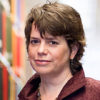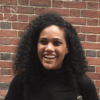By Javier Rosario
Engaging in responsible and effective archival work remains a challenge even with the now-customary use of digital technologies. If anything, these technologies have raised the stakes for archivists to ensure that their methods don’t cause harm to the people represented in and connected with their collections. Panelists considered these issues and others during a virtual event on April 14, sharing their own experiences and discussing both pragmatic questions and important principles with several Northeastern-affiliated projects.
Moderated by Professor Elizabeth Maddock Dillon and English PhD Student Avery Blankenship, the panel—part of Northeastern’s “Information, Algorithms, and Justice” speaker series—featured four leading scholars: Dorothy Berry, Digital Collections Program Manager at Houghton Library in Harvard University, Jessica Tai, Archivist at Yale’s Beinecke Rare Book & Manuscript Library, Valencia L. Johnson, Archivist for Student Life at Princeton University, and Zakiya Collier, Community Manager, Documenting the Now / Shift Collective. This packed panel shared best practices in digital humanities and archival curation, particularly in collaborating with local communities to avoid both the obvious and subtle snares of working within what are often white-dominated institutions.
Dorothy Berry (slides) started things off by stressing the importance of knowing the limits to one’s own expertise. For Berry, it is crucial that archivists understand their own motives and impulses while doing their work. “Even work we consciously identify as inclusive, anti-racist, decolonial, what-have-you, may still be serving the ego more than anything else,” Berry said. “Identifying our work as anti-racist does not mean that we’re not just replicating white supremacy with a different label.”
So, what can archivists do to check these motives and curb unhelpful impulses? Jessica Tai (slides) provided a possible framework: cultural humility. As she put it, this involves lifelong critical self-reflection, institutional accountability, and the recognition of power imbalances. This stance is something Tai found essential in her own work studying the history of JapaneseAmerican incarceration during World War II as part of a pilot project completed by the Reparative Archival Description Working Group (RAD). Here, Tai and her fellow working group members practice cultural humility by asking community groups like Densho and the Japanese American Citizens League to advise on a preferred terminology resource created in consultation with them.
Stressing this engagement with communities outside the academy, Tai referenced her article in the Journal of Critical Library and Information Studies, saying that “cultural humility prompts archivists to acknowledge that they will never have all the answers there for opening space for other voices, and [allows] nontraditional forms of expertise to inform decision-making.”
Valencia Johnson (slides) continued to highlight this focus on nontraditional forms of expertise. According to her, the closed-off methods of academic institutions can be counterintuitive, undercutting the power of research and its impact on the communities archivists intend to help.
“Who are we leaving out when it comes to our collection development policies?” Johnson asked. “Are there policies and procedures in place that are actually fulfilling their intentions? Or are they just creating unnecessary barriers?”
More than improving archival methods and practices, Zakiya Collier also expressed how experts should know when to get out of the way of community efforts and non-institutional practices. When it comes to combating white supremacy and its oppressive systems, scholars might need to move out of the way and allow harmed communities to organize their own archival efforts. According to Collier, this may involve redistributing funds from institutions to community-based archives, supporting efforts and calls for legal support, and helping (or not intervening) in whatever other ways may be needed.
“I think we as information professionals at times tend to be navel gazing and missionary, and want to go out and help communities,” Collier said. “But many times, the call is for us to listen.”
After listening to these ideas, representatives for several Northeastern-affiliated projects had the opportunity to ask the panelists for insights into their own ongoing work. These projects included the Digital Transgender Archive, represented by Eamon Schlotterback; Apartheid Heritages, represented by Vanessa Torres and Cassie Tanks; the Women Writers Project, represented by Cailin Roles; the Early Caribbean Digital Archive, represented by Alanna Prince; and the Northeastern University Library, represented by Amanda Rust. Discussion centered on clarifying project goals, setting standards for transparency, and considering how language should shape and be shaped by one’s intended audience.
For Berry, language can often be as much of an institutional trap as it is a descriptive one. “It’s interesting to me when people outside of standards-bound archival institutions are still so tied to those standards,” she said. “Liberating yourself from some of those standards might provide more ability to describe things more freely.”
Cultural humility, intellectual self-awareness, openness to nontraditional methods, and enthusiasm for non-institutional projects. These and more ideas were introduced and reinforced by the four panelists. It may take effort and time, but each of them hopes that these practices will become more widespread and create a real impact. Above all, they hope such work will instill greater care and responsibility in archival projects.
As Collier said, “In order to be accountable to something, and for something, you have to care about it.”
Image credit: Elizabeth Page Harris Papers (MS 771). Manuscripts and Archives, Yale University Library.








